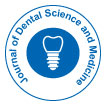开放获取期刊获得更多读者和引用
700 种期刊 和 15,000,000 名读者 每份期刊 获得 25,000 多名读者
抽象的
Dental Implant Failure as a Risk Factor for Selective Serotonin Reuptake Inhibitors: A Study of Clinical History
María Quintanilla
Antidepressants, particularly selective serotonin reuptake inhibitors (SSRIs), have seen an exponential rise in popularity in recent decades in Europe and the United States. This retrospective study wanted to find out if there was a link between taking SSRIs and dental implant (DI) failure or survival, and secondarily, how other systemic and local factors affected it. The STROBE (Strengthening the Reporting of Observational Studies in Epidemiology) observational study guidelines were followed in this retrospective cohort study. 573 DIs were given to 170 patients altogether. The reported failure rate for DI was 6.11 percent. 18.31 percent of these failed in patients who were prescribed SSRIs, while 4.38 percent failed in patients who were not. In particular, the multivariate analysis revealed 3.70 times higher adjusted risk and a 4.53 times higher hazard ratio for DI failure when these drugs were used. These patients also had a lower rate of DI survival at 90 months compared to those who did not take them. With the restrictions of the current review, it tends to be certified that there is a connection between the admission of SSRIs and DI disappointment, as well as a lower endurance rate in these patients.

 English
English  Spanish
Spanish  Russian
Russian  German
German  French
French  Japanese
Japanese  Portuguese
Portuguese  Hindi
Hindi